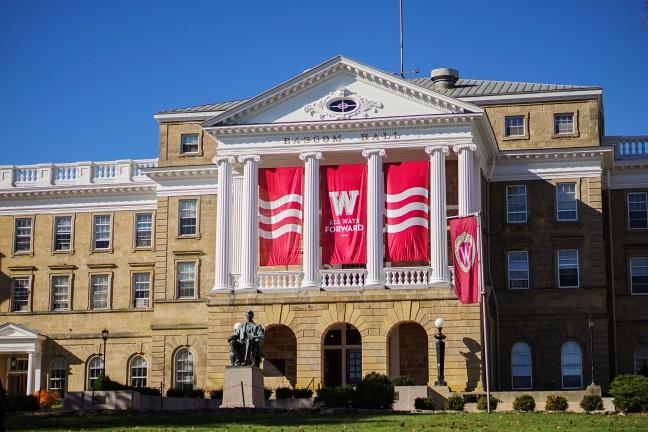Editor’s note: Yusra Murad is a facilitator for Our Wisconsin.
In the middle of March 2016, the University of Wisconsin witnessed to a hate crime pulled straight out of the 1950s — after verbal conflict, a freshman woman of color was shoved and spat on.
The administration expressed immense regret regarding the increasingly tumultuous campus climate surrounding culture, race and intolerance, and students reacted with a combination of fear, anger and mistrust.
#TheRealUW: Students tell stories of racial bias, UW ‘not doing enough’
The hate and bias incidents many of us saw in the spring, were the catalyst for the creation of Our Wisconsin, an initiative to train incoming freshmen on cultural competency. Above all, Our Wisconsin aims to encourage students to understand how their own identity impacts their role in society, and to learn to respect their peers regardless of how they choose to identify.
UW officials unveil initiatives to address campus racial climate
Since its inauguration, the program has faced a relatively constant stream of pushback. Conservative lawmakers and even professors have time and again expressed frustration that the university is funding a training they see as not only unnecessary, but an offense to free speech.
The second paragraph of the UW mission statement reads: “The university seeks to help students to develop an understanding and appreciation for the complex cultural and physical worlds in which they live and to realize their highest potential of intellectual, physical and human development.”
I would argue spending money on programs to maximize appreciation for the complexity of culture and eliminate the use of hate speech on campus is not a kind gift from the university to marginalized students on campus, but a cold and hard responsibility outlined by the UW System Board of Regents.
UW freshmen are required complete Alcohol Edu and the Tonight Program in order to enroll in courses — the university strongly believes a comprehensive curriculum on both of these issues is critical for success in college, as they should.
Alcohol and rape culture can be devastating forces in a student’s time here. But they are not the only ones.
Intolerance is no less of a force on campus than sexual assault or alcohol abuse. In fact, the three are woven together in an intricate net we all find ourselves tangled in. The rejection of one’s identity may pave the way to drug and alcohol abuse. It is the misunderstanding of gender roles, feminism and misogyny that may lead to sexual violence.
University of Wisconsin under federal investigation for handling of sexual assault cases
Training on cultural competency is as crucial to our student body as is training on alcohol or sexual assault, and the benefits of formal workshops on diversity are unending. Too often, students fall into the assumption that diversity is exclusive to racial paradigms, a measure of black and white or a notion that repels many from important conversations they feel they have no say in. Diversity of socioeconomic status, family structure, age, gender and religion among so many others are traditionally ignored. So Our Wisconsin expands this definition.
On a predominantly white campus, the student body is overwhelmingly unaware of how inequity at the group and systematic level impacts their fellow students of color. Again, the ties to alcohol abuse and sexual assault are blindingly clear. Women of color are statistically more likely to be raped — most notably American Indian women, who face a lifetime rate of sexual assault of 34.1 percent as compared to 17.7 percent for white women — and Hispanic and Black Americans have higher rates of binge drinking.
The UW administration can benefit greatly from supporting a program like Our Wisconsin. Encouraging attendance at these sessions or even making them mandatory, leaves no room for freshmen to question whether this is a university genuinely committed to maintaining an atmosphere of acceptance and humanity. In the wake of last semester, eyes across the nation are on UW, and we should feel a prodigious pressure to prove we are better than that, because we are. If asking for a space where everyone feels safe and no one feels obliged to conceal their sexuality, political views, ethnicity or religion, is considered being a whiny millennial, then I’ll whine the night away.
Freshmen, if you’re reading this — you’re right, it’s not mandatory. You could opt to spend those two hours catching up on class readings, taking a walk with your parents or making dinner with friends. But skipping out on this opportunity is denying yourself the chance to engage in the types of conversations many go their whole lives without.
As the program has faced attack from the outside, many of us from the inside have felt forced to explain what Our Wisconsin is not. I will tell you what it is. It is a workshop on acceptance and respect.
There is no lecture on systematic racism in our justice system or Powerpoint presentation on misogyny. It’s a chance for you to connect with your floormates, hear their stories and feel powerful in your own space.
It will make you better. It will make you say, “I never thought about that before” many, many times. It will make you love yourself, filling you with confidence at a time in your life when confidence is hard to come by. It will challenge you in more ways than one.
When you accepted your admittance to UW, you inadvertently made a promise that you would, in the next four years, do something to make the world a better place. Start by making this place a better place.








